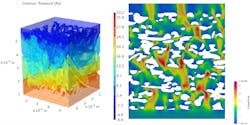Research Center Expands Simulation Capabilities
The Fraunhofer Institute for Manufacturing Technology and Advanced Materials (IFAM) reported it has expanded its simulation capabilities for investigating fluid and energy processes in materials. The new capabilities also will IFAM researchers to investigate systems and networks and predict phase-change materials (PCM) and their behavior and effects in components.
IFAM, in Dresden, Germany, is one of several dozen commercial research centers in the Fraunhofer network; it is specifically dedicated to investigating manufacturing engineering and applied materials.
One new resource is OpenFOAM software for flow simulations, giving scientists there significantly more possibilities for model development and implementation.
Also new is COMSOL Multiphysics software for structural mechanical calculations by determining the stress distribution in solids under a defined mechanical load. COMSOL Multiphysics also can be used to design thermal systems with phase-change materials (e.g., heat storage systems) which complements IFAM research into coupled flow and energy transport processes.
In addition, researchers have available the OpenModelica open-source program to calculate systems from spatially zero and one-dimensional components.
And, the COMSOL Application Builder extension, customer-specific programs that are used directly by the client can now also be developed.
Using these new software resources, data from imaging processes (microstructure tomography) can be converted into computable 3D models, both voxel-based and smoothed, and exported as STL files. Thus, flow and energy transport processes in microstructures can be calculated in more detail than before.
The new tools added to IFAM’s existing software portfolio, the new programs make it possible to calculate velocity and pressure distribution in-flows (computational fluid dynamics, CFD), stationary and unsteady temperature fields of solids (heat transfer), and the consideration of non-isothermal flows (conjugate heat transfer, CHT.)
The modeling, numerical calculation, and simulation of fluidic and energy-related processes in components and systems is used by IFAM’s Energy and Thermal Management department to address detailed questions in flow and energy systems, such as recalculation and analysis as well as prediction and estimation of parameters. Customer-specific test rigs also can be developed and designed. In addition, the scientists conduct research on the thermal and geometric optimization of components and perform strength analyses of thermally and mechanically stressed components.
